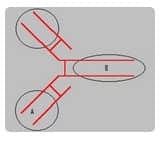Exam Details
Exam Code
:ASCP-MLTExam Name
:MEDICAL LABORATORY TECHNICIAN - MLT(ASCP)Certification
:ASCP CertificationsVendor
:ASCPTotal Questions
:572 Q&AsLast Updated
:Apr 15, 2025
ASCP ASCP Certifications ASCP-MLT Questions & Answers
-
Question 201:
Monoclonal antibodies are usually produced by:
A. Cultured T cells
B. Human plasma cells
C. Hybridomas
D. Cytotoxic T cells
-
Question 202:
Which of the following tubes produces a serum sample? Question options:
A. green
B. pink
C. tiger (red-gray)
D. blue
-
Question 203:
Though automated extraction machines have many benefits over manual methods the costs are high and generally require a high throughput of samples in order to justify the costs.
Automated extraction has many benefits over the traditional manual methods. The most important benefit is that the nucleic acid isolated is constantly consistent. There is a reduced amount of manipulation with dramatically decreases the
chance of cross contamination. Also, automated extraction machines are considered moderate complexity and can be performed by a wider variety of laboratory professionals.
All of the following are considered benefits of automated isolation and extraction equipment EXCEPT:
A. Automated isolation equipment is cheaper and more practical
B. Automated isolation equipment requires less manipulation
C. Automated isolation equipment is considered moderate complexity
D. Automated isolation equipment provides consistent results
-
Question 204:
Personal protective equipment (PPE) should be put on in the following order:
A. gloves, gown, and mask
B. gloves, mask, and gown
C. gown, mask, and gloves
D. mask, gloves, and gown
-
Question 205:
Match terms with fragments resulting from papain digestion of an IgG molecule:

A. Fab fragment OR Fc fragment
B. Fab fragment OR Fc fragment
-
Question 206:
The National Heart, Lung, and Blood Institute initiated the National Cholesterol Education Program (NCEP) in 1985. The goal was to reduce the number of Americans with elevated cholesterol and thus reduce illnesses and deaths in the United States due to coronary heart disease. Three adult treatment panels have been published since then with clinical practice guidelines for managing cholesterol levels in adults.
The most recent panel, Adult Treatment Panel III (ATP III), was published in 2001 and updated in 2004. The NCEP: ATP III also includes criteria for the diagnosis of metabolic syndrome.
Select the set of laboratory assays that are utilized in the NCEP: ATP III criteria for metabolic syndrome diagnosis.
A. LDL-C, triglycerides, HDL-C, and fasting blood glucose
B. Fasting blood glucose, triglycerides, insulin, and VLDL
C. Fasting blood glucose, triglycerides, HDL-C
D. Fasting blood glucose, triglycerides, HDL-C, and VLDL
-
Question 207:
In healthy individuals, procalcitonin is only synthesized by the thyroid C cells. In bacterial infections, PCT is synthesized in various extrathyroidal neuroendocrine tissues.
In healthy individuals, procalcitonin is synthesized by which cells in the body?
A. Hepatocytes
B. Leukocytes
C. Thyroid C cells
D. Red blood cells
-
Question 208:
Nucleated RBCs may be seen in the peripheral blood in cases of beta thalassemia major. Nucleated RBCs are usually not found in peripheral blood in cases of beta thalassemia minor and beta thalassemia intermedia, and would not be a finding in beta thalassemia minima.
Nucleated RBCs are most likely to be seen in the peripheral blood of which of these beta thalassemias?
A. Beta thalassemia minima
B. Beta thalassemia minor
C. Beta thalassemia intermedia
D. Beta thalassemia major
-
Question 209:
Chain-of-Custody procedures must be followed for
A. routine urinalysis for glucose and ketones
B. Throat swabs of groups A beta streptococcus screening
C. Therapeutic drug threshold determinations
D. blood specimens for alcohol level determination
-
Question 210:
Match each of the following definitions associated with heart disease and heart failure to the term that it defines.
1.
Congestive heart failure
2.
Infarction
3.
Ischemia
4.
Angina
A. An inadequate blood supply that decreases availability of oxygen.
B. Chest pain caused by inadequate supply of oxygen to heart myocardium.
C. An area of tissue death that occurs due to lack of oxygen.
D. A left ventricular dysfunction resulting from aging, hypertension, atherosclerosis or muscle damage from an AMI or repeated AMIs.
Related Exams:
Tips on How to Prepare for the Exams
Nowadays, the certification exams become more and more important and required by more and more enterprises when applying for a job. But how to prepare for the exam effectively? How to prepare for the exam in a short time with less efforts? How to get a ideal result and how to find the most reliable resources? Here on Vcedump.com, you will find all the answers. Vcedump.com provide not only ASCP exam questions, answers and explanations but also complete assistance on your exam preparation and certification application. If you are confused on your ASCP-MLT exam preparations and ASCP certification application, do not hesitate to visit our Vcedump.com to find your solutions here.